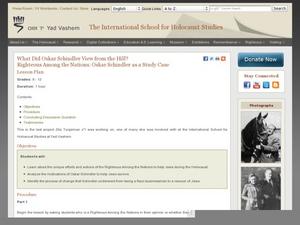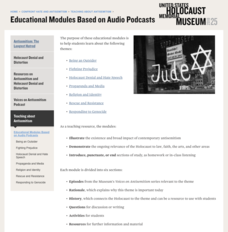Echoes & Reflections
Studying The Holocaust
While many young scholars are familiar with the Holocaust, they may not understand the specific history that led to the unprecedented atrocity. The first lesson in the unit helps teachers gauge their pupils' background knowledge. A...
Curated OER
"You're Probably Tired, Dear Diary" - Children's Diaries during the Holocaust
As part of the study of WWII and the Holocaust, class members read a series of diary entries written by children during the onslaught of Nazi occupation. Each entry is accompanied by biographical information and discussion questions. The...
Curated OER
"Your Son, Your Only One" - The Sacrifice of Isaac as a Motif in Holocaust Poetry
Class groups examine a series of poems that use Abraham’s willingness to sacrifice Isaac as a motif in Holocaust poetry. Included are questions, notes to the teacher, and bibliographical information on each poem. The activities could be...
Carolina K-12
Introduction to the Holocaust
Young historians gain a well-rounded insight into the tragedy of the Holocaust by exploring pre-war Jewish life, reading and discussing survivor testimonies, and illustrating their understanding by using their own words and those of a...
Facing History and Ourselves
The Holocaust: Bystanders and Upstanders
Scholars analyze the role of bystanders during the Holocaust. The investigation explores the roles of the bystanders, upstanders, and rescuers with primary and secondary resources to determine actions taken—or not—and their implications...
Echoes & Reflections
Nazi Germany
The Holocaust was an evolution of anti-Semitism, scapegoating, and targeted violence against Jews with Nazi policies. A resource unpacks the escalation in violence, along with the erosion of democratic institutions, during the 1930s....
US Holocaust Museum
Time Capsule in a Milk Can
Imagine dumping out a milk can and finding letters from one of the darkest moments in history! Scholars use Holocaust Reading Passages and research to discover how people recorded and hid history during the events of World War II. They...
Curated OER
Holocaust Studies: Five Poems by Dan Pagis
Teaching a unit on the Holocaust? Consider using the personal statements of Dan Pagis’s poetry to contrast with the more “distanced” historical accounts found in textbooks. Five poems, discussion questions, and background notes are...
Facing History and Ourselves
Kristallnacht: Decision-Making in Times of Injustice
Have you ever been singled out in a crowd before? Pupils investigate and analyze the events of the Holocaust. They dive into the life of a middle school student, as well as the diary entries of those in Kristallnacht during World War...
Constitutional Rights Foundation
U.S. Immigration Policy and Hitler’s Holocaust
Though the Statue of Liberty welcomes political refugees to her shores, the welcoming sentiment has not always been reflected in the American citizenry. High schoolers read about the regrettable period in United States history...
North Carolina Consortium for Middle East Studies
The Importance of Holocaust Remembrance
Designed as the culminating activity after a unit study of the Holocaust, class members assume the voice of a world leader, write a speech, and participate in a simulation of the Stockholm International Forum on the Holocaust.
Curated OER
Righteous Among the Nations: Oskar Schindler as a Study Case
The Righteous Among the Nations are non-Jews who risked their lives during the holocaust to save Jews in countries under Nazi rule. Class groups examine the criteria for being named to this group and then must decide, based on the...
While They Watched
Teaching the Holocaust
What is the difference between prejudice and discrimination? Between collaborators and bystanders? Guilt and responsibility? Prompt learners to think critically about a very complex and textured topic with an innovative packet...
US Holocaust Museum
Deconstrucing the Familiar
Collaboration and complicity. Class members examine a series of photographs and consider how active participation and passive complicity represented in the photos contributed to the Holocaust.
Curated OER
Anti-Semitism Workshop
Originating from the Yad Vashem Holocaust Memorial Museum in Jerusalem, here is a resource to support your world historians in their study of World War II, the Holocaust, your cultural scholars learning about anti-semitism, or your...
University of Southern California
Deconstructing Genocide: The Ultimate Crime Against Humanity
There are eight stages of an atrocity known as genocide, and it's important to understand how they are represented so we can fight against it in the future. As young historians watch video clips of ten Jewish Holocaust survivors'...
Curated OER
"The Gambler" and "The Journey": A Comparison of Worlds in Two Short Stories
“The Gambler” and “The Journey” offer readers an opportunity to experience two very different views of Jewish life in Poland between WWI and WWII. Whether used as a part of a study of the Holocaust, or as a compare/contrast exercise, the...
Speak Truth to Power
Elie Wiesel: Speaking Truth to Genocide to Power
Invite your learners to discover the efforts of Night author Elie Wiesel to promote awareness of genocide in the world. After watching and reading an interview of Elie Wiesel, high schoolers work to create a living Holocaust...
Curated OER
Maus: After Reading Strategy Instructional Routine
Class members create literary mandalas for two characters from Maus, Art Spiegelman’s graphic novel about his father’s experiences with the Holocaust. After finding quotes that reveal three good traits and three bad traits of each...
Shaker Junior High School Library Media Center
WWII Project Outline
Work together as a class and get to know the ins and outs of World War II with this engaging collaborative project. Class members are broken into groups to research particular war topics, from life on the home front to the Holocaust and...
Echoes & Reflections
Perpetrators, Collaborators, and Bystanders
After the Holocaust, the world grappled with how to bring justice to the Nazis. But what to do with the thousands—if not millions—who allowed it to happen? Young historians consider the issues of guilt, collaboration, and responsibility...
Facing History and Ourselves
How Should We Remember?
We must remember the past in order to avoid its mistakes. Young historians analyze the importance of historical remembrance using primary and secondary documents, as well as video clips. They then study the creation of a World War...
US Holocaust Museum
Educational Modules Based on Audio Podcasts
Imagine hearing someone claim an event like the Holocaust never happened. Pupils use audio podcasts and reading passages to dive into the lives of those impacted by the Holocaust of World War II. Using the information they gather, class...
US Holocaust Museum
Remember the Children: Daniel’s Story
Imagine being a child forced from your home and into a concentration camp during World War II. Scholars prepare for a visit to the United States Holocaust Museum by researching the children of the horrible event. They analyze...























